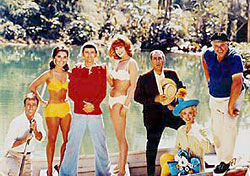
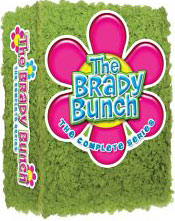
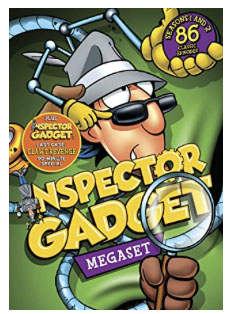
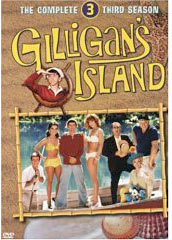
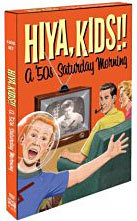

 |
 |
 |
 |
 |
 |
|
|
||||||
|
Without Sherwood Schwartz, television history would be missing two key programs – "Gilligan's Island" and "The Brady Bunch." Schwartz created those two programs, which prompted a series of spin-offs, and made stars of their casts. He also created the short-lived program "It's About
Time," which today is best known for its theme song than for its
plot about astronauts who land on a planet still in the Stone Age. Not to mention the connection between Hamlet and the opera
"Carmen."
SS: Yeah. TVP: That was their bright idea? SS: It was a gentleman — and I use the term loosely — named Jim Aubrey. That was his idea. And I kept saying to him, "Jim, that's an idea for a show but that's not my show. That's an idea for travel fun. My idea is a serious topic, but I do it in a funny way. It's how seven strange people can learn to live together. It has a very strong reality base. Yours is a different show." He said, "Well, I like mine better." I said, "Well, that's up to you."I'll tell you how he told me that the show was sold. He called me from New York. His official title given to him by everyone, he was the smiling cobra. That's what they called him in Time magazine. His greatest delight in life was to fire somebody, and he always had a smile on his face when he was doing it. He called me from New York. He said, "Sherwood I hate your fucking show, but I just have to put it on the air." There's other ways to say that. [laughs] TVP: It was not an easy sale, I gather from reading your book. Your agent didn't like it. The network brass didn't like the idea. SS: There was an interview on one of these shows that tells the background of a show. Perry Lafferty, the then-president of CBS West Coast, was interviewed and he said, "I thought it was a stupid show. Nobody liked it." And then they interviewed Mike Dann, who followed Jim Aubrey: "I don't even know why Jim put it on the air because it was a terrible show." Everybody agreed it was a terrible show and it's still running every night everywhere. TVP: So why did they put it on the air if no one at the network liked it? SS: The audience. The audience put it on the air. They test pilots. I don't know if you know that. TVP: They test pilots on an audience.
TVP: At that point, theme songs to TV shows weren't used to explain anything about the shows? SS: No. That's why he didn't understand what I was talking about. TVP: And now you have one of the most famous theme songs in history. SS: Probably the most. Probably. TVP: That and of course your other one, for "The Brady Bunch." SS: Yes. And I'm not even a songwriter. [laughs] TVP: Your first agent didn't like "Gilligan's Island." SS: No. TVP: The network didn't like it. SS: Well, I don't know if my first agent didn't like it. He said, "Sherwood you're out of your fucking mind" [laughs]. TVP: What kept you going? Why didn't you just give up?
TVP: How did you decide on seven as the magic number for the characters? SS: I don't know. A lot of people have written to me saying they understand that's the seven deadly sins. That was never in my mind, but they've explained it to me [laughs]. It could have been eight. It could have been six. I couldn't see 12 people. As a matter of fact, if I were to create the show now, I would not have seven white people. In order to accommodate the progress of the world, which is all for the good, I'd have to have like a black or two blacks. I would have to have a Chicano, a young Mexican-American. I would have to have an Asian. I would have to have a different mixture of people if I was staying with what my idea was to begin with. Because seven very unlikely people have to learn to live together. So I'd have to rearrange the characters in that sense. TVP: You were pre-med in college, right? SS: Yes. As a matter of fact, I have a master's degree in biological sciences. TVP: So how do you go from that to Hollywood and being a writer? SS: You want to know all this? TVP: Yes. SS: I'll tell you. My aim was to be a doctor. I came through at a time, which was the mid-'30s, when the AMA in its infinite stupidity believed that your religion had a lot to do with things. I'm Jewish. The AMA used to tell medical schools how many Jewish students were allowed in a class. If you were in North Dakota where there aren't hardly any Jews, maybe one would get in. If you were in New York, which I was at that time, out of an entry class of 100 they would allow 10 Jews. But 90 percent of the people trying to become doctors in the New York area were Jewish. As a result, if your father was a doctor, that was OK. If your father was the head of a hospital in the area, that was OK. If it was just grades, you have major problems. I had major problems. I wasn't summa cum laude. There was only one summa cum laude in my graduating class at NYU where I took my bachelor's degree, and he never became a doctor. But he was Jewish. Now that didn't mean if you were non-Jewish you would automatically get in. It just meant that you had to have very good grades to get into a medical school. But you could have very good grades and be non-Jewish and get in. If you were Jewish you had other trouble. So I was advised to change my name from Sherwood Schwartz to Sherwood Black because Schwartz is like a German word for black and where it says religion because in those years you to had to put down your religion, instead of saying Jewish they advised me to put down Unitarian, which is like the mildest of Christian beliefs, at least that's what I'm told. I said, "Look, I'm Jewish. I'm not ashamed of that. My name is Schwartz and I'm not ashamed of that. I'm not going to be changing anything to get into medical school." So as a result I didn't get into medical school. TVP: Who was advising you to change your name and change your religion? SS: It was the people in the offices at NYU. It was an accepted fact that you were going to have problems. I could have gone to Canada and gone to a medical school. I could have gone to Scotland. I could have gone to five places where if you had good grades you could get into school. But then when were you were limited to where you could practice. You couldn't automatically be able to take your medical degree and open an office in New York. You couldn't, as a matter of fact. TVP: A foreign medical school wasn't as good as an American medical school?
While I was getting my master's degree I was living with my brother, Al. Then I finished my work on my degree and there were still six or seven episodes of the "Bob Hope Show" to be done. This was radio. And so I said to him, because it didn't seem to me to be very hard to write jokes. I said to Al, what if I write some jokes? Would you show them to Bob? If you tell me the topic the show is about I'd like to write some jokes. And if Bob likes them maybe you could give me five dollars, 10 dollars a joke. For 10 dollars you could eat for a week, in those years. TVP: Did you think you were a naturally funny person?
Anyway, I thought I could write material. I wrote some jokes and my brother gave them to Bob and Bob used some of them and they got big laughs. I did it a second week. And meanwhile Bob didn't give me any money so I said hey I thought I was going to get some kind of money from Bob. He said, "Well, let me talk to Bob."He talked to Bob and the next thing I knew I get a call from Bob's agent, a guy named Jimmy Saphier. And Jimmy says, "Bob likes the material you've written very well. Why don't you come on the show as a regular writer for fall?" I said I'm trying to get into a medical school. He said, "That's important to you?" I said yeah. I went to pre-med and gotten a degree in biological sciences. That's what I really want to do. He said, "Let me talk to Bob." Bob was very, very nice. He said, "I tell you what. I like the way he writes. I want him on the show. But I respect his wishes. And if he doesn't get into a medical school I would like him to join the staff." So Jimmy calls me and says that's what Bob said. That's a terrific offer to make. All he ever saw was the four pages of jokes that I wrote and he wanted me on the staff so I guess he must have liked those jokes. TVP: Do you recall what any of those jokes were? SS: No. I have no idea. It's buried in my mind. TVP: How many medical schools were you sending applications to? SS: Too many. Too many. TVP: And when did you realize you weren't going to get in? SS: When I was sitting on the steps of the library at NYU. There was a congregation of young men who had just spent four years breaking their asses. Pre-med is a very tough discipline. And all of them are sitting there reading their rejections to all these medical schools and 90 percent of them are Jewish. Not the medical schools, the boys. We're all just sitting there looking at a blank wall. I didn't believe that my religion or my name would matter if I got good enough grades. I could not comprehend that. When things are so terrible you can't believe it, it's the truth. That's a generality that applies. So we didn't believe it. We worked hard, got our degrees and we got good grades and we were faced with looking for other work. Well mine just fell into my lap. I was very fortunate because Bob wanted me on his show. I was with Bob for almost five years until I was drafted. Off the show and into the Army, where I continued to write. Those command performances and a lot of Army shows. I worked with about everybody you ever heard of, and probably some people you never heard of but who were famous stars at that time. Because the Army had access to all stars and they all did it for nothing, so you'd do shows with anybody and everybody. And we did.
TVP: What did working for Bob Hope show teach you about comedy or comedy writing? SS: Well, it taught me a great deal. It taught me brevity. I forget who said it originally but maybe it was Shakespeare, brevity is the soul of wit. When you wrote for Bob Hope, you didn't worry about adjectives and pronouns. You just wrote the bare bones joke because that was the only thing that counted. There were no flowery words. There was no description. It was just jokes. He had a monologue, that was his pride and joy, was the monologue, and he would tell 16 jokes. He would do a preview in which there were 30 jokes and then he would do the 16 that got the best laugh. Bob put those together himself. He didn't write them. He put them together. So I learned brevity. I learned you don't have to have 16 lines getting to a joke. You can do it in three. So that you could hit fast and go on to the next one. Nowadays they carry that to an extreme. If you look at the situation comedies that are on now, there's just one line. A guy comes in the room and says something funny. Another guy comes in the room and says something funny. Another guy comes in the room -- or a woman or whoever it is – and says something funny. There are no straight lines anymore. Well, straight lines also destroy character. If you're just doing punch lines, you can't develop character. I think that's wrong with today's comedy. But nobody asks me so I don't tell them. TVP: You wanted to do your own show. You didn't want to keep working on other people's shows and you created "Gilligan's Island." SS: Right. TVP: But you weren't discouraged after the pilot was rejected again and gain. SS: No. I have belief in what I do. We're living in a real world, so most writers have to write what they're asked to write because they have kids, they have a mortgage on their house, they have dental bills, they have all kinds of problems. Writers are people. It's common, I think, for people to blame writers for what they see on television and that's unfair because unless writers write what they're asked and changes to the way the network or production company tells them to change it they're not going to work. And if they're not going to work, their wives are not going to buy clothes, their kids are not going to be fed. They have to work. The problem is writers have to do what they're asked to do unless they want to face the long battle of trying to get their own idea on the show they want it to be. Those are battles. You read a whole book about my battles. TVP: A lot of battles. Then once the show finally got on the air, the critics weren't too kind. SS: I never care about critics. Critics are not people. They're trying to show off how smart they are by playing everything down, unless it has a so-called intelligence background, like "West Wing." But my shows never seemed to be intellectual. So they always complained. They complained about "The Brady Bunch" too. They didn't like that. TVP: I saw in your book that people were writing letters to the Coast Guard saying rescue these people from "Gilligan's Island." SS: Yes. TVP: People actually thought this was a documentary of some sort. SS: That's right. It's hard to believe. I don't know where they thought the music came from, and the laughter, and the commercials. But people believe. I have some absolutes in my writing. Even though certainly "Gilligan's Island" was a very broad show, nevertheless no idea was ever permitted to go through, it never was allowed to start unless I could explain -- I'm now talking particularly about shows that had a guest star -- unless I could be comfortable with getting the guest star off logically. Some reasons, it's stretched because it's comedy, but it had to be logical up to a point. There's a certain amount of logic that forms the basis for comedy. TVP: Were the guest stars always part of the idea for the show? SS: No. TVP: When did they come into the picture? SS: After about six or seven shows. Again this was prompted to a certain extent by CBS executives, Hunt Stromberg in particular. "It's just going to be dull if nothing ever happens except these same seven people."I said I can get somebody on the island but I want to get rid of them because I want this show to be about the seven people I have chosen. He said, "Well, just keep it fresh." I promised him. I promised the network. I said the minute you see it going stale, tell me and first of all, I won't do the show. I fortunately never believed that money was the end-all. Money never meant anything to me except I wanted it but I had to get it my own way. I wasn't going to do a show that I think is going to be unsuccessful just because they give me a lot of money to do. I would not do it. I was offered that many times. They told me an idea and they said would you want to do this? I said no. I don't want to do it.
CBS said, "Do you want to take over the show?" I said I don't want to take over the show. I said I have 10 toes. I like every one of them. I'm not going to do the show. They said to me, "What would make you do the show?" I said I can't imagine anything. As I say money was not the issue. I thought he was a hilarious comic. He was in my estimation the greatest pantomime comic that ever lived. He's doing the wrong show, in my estimation. That's what I told CBS. Which meant to them well we'd better give this guy a lot of money if he wants to do a whole new show with him. But it didn't. It just meant I thought he was doing the wrong show. They said did I think I could fix it? I said yeah. They said, "What would make you come on the show?" I said if I could just do the script. I don't want any meetings with Red. I said that's the condition. I did the show for seven years and never had a meeting with him. I just would write the scripts. And he never even knew what character he was playing from week to week. He would do 90 percent of it or 40 percent of it and he would always throw in stuff from things he remembered, but the show became immediately successful and at the end of the year when I was on the show it was No. 1. TVP: What had he been doing wrong up to that point? SS: It was really so simple if they stopped to analyze it. He was doing a show where he did bits and pieces of all his characters. He would do his Freddie the Freeloader, then he would do the Mean Little Kid, then he would do Deadeye, the sheriff. He had about six characters and he would do three or four minutes of them in every show. I said he's kicking away his audience who wants to see one of those shows. I said he should star one of his characters in each of the half-hour shows. So he would do a half-hour show with Freddie the Freeloader. And a half-hour show with Clem Kadiddlehopper and then you would do a whole show about a whole character and then he in effect would become his own guest star from one show to the next. And then people would say gee I'd like to see Freddie again and by that time Freddie was again there. So he wouldn't kick away all of his characters every week in these three-minute bits. TVP: So you got to keep your toes. SS: Yes. I got to keep my toes. And he got to keep his show. That made it very successful. I didn't make it successful. He made it successful. I just gave him the framework in order to make him as good as he could be, which is the best. I did a show, which to my knowledge is the only show in the history of the writer's guild that didn't have a single word in it. Not a single verbal word. It was all description, about Freddie the Freeloader in one of those half-hour shows, for which I won a writer's Guild Award. For a show that didn't have a word. TVP: But it had to be written. SS: Oh yeah. It was some 30, 35 pages of directions.
READ PART TWO OF THE SHERWOOD
SCHWARTZ INTERVIEW |
Sherwood Schwartz Interview Sherwood Schwartz, creator of so many great classic TV shows like Gilligan's Island, The Brady Bunch and It's About Time passed away July 13, 2011; he was 94. He left an indelible mark on our culture, whether you liked his brand of humor or not, it was upbeat entertainment.
TV
on DVD / / / Holiday
Specials on DVD
|
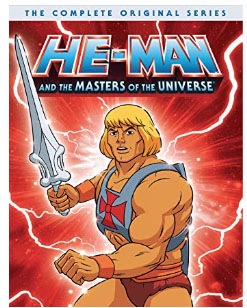 |
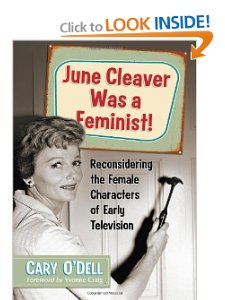 |
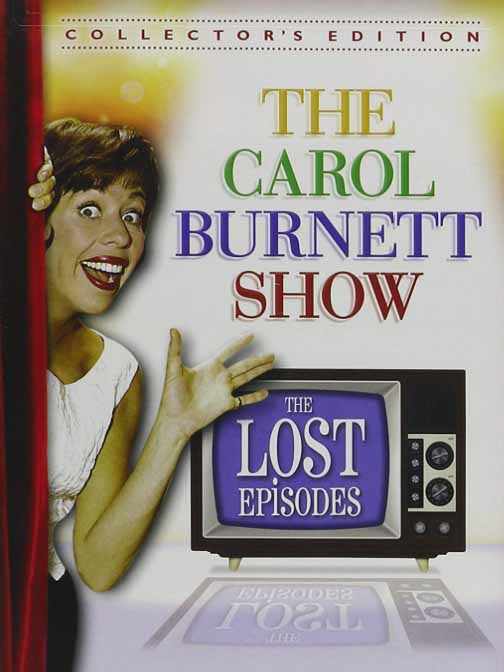 |
 |
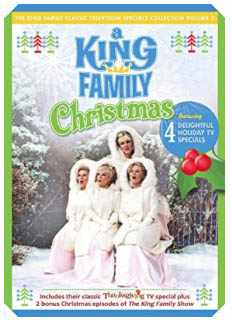 |
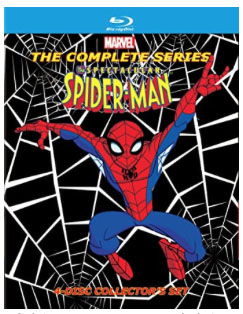 |
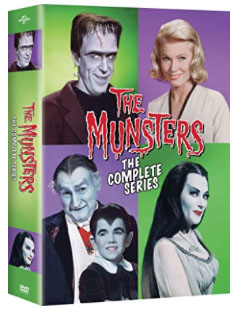 |
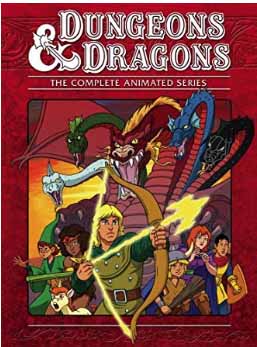 |
| TV Shows on DVD/ / / / / / / Classic TV/ / / / / / / Punk Book/ /
/ /
/ / / / / / /
Holiday
Specials on DVD / /
/ / / / Classic
Commercials |
|||||||
|
|
||||||||||
Save money! |